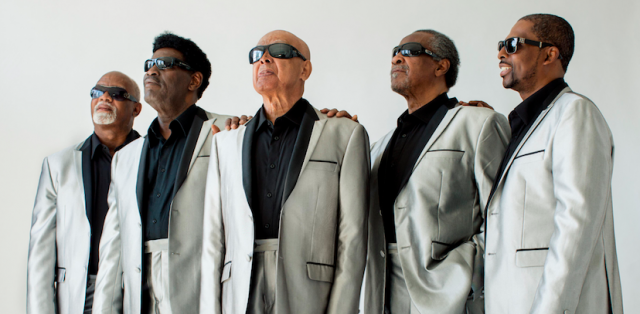Home > (P)reviews
01/24/2017
"How Sweet the Sound–The Blind Boys of Alabama" - 34th Reel Music Festival - Wednesday, January 25
By DAVID VEST // Part of the problem in trying to document them is that the Blind Boys are such a moving target, with membership constantly in flux.
While it is not without interest, this is not the documentary the Blind Boys of Alabama or their fans deserve. For one thing, anyone can spend five minutes online and come up with far better concert footage than anything on offer here, and it is their incendiary live performances that make the main claim on our attention.
There is no punk band, no thrashing metal outfit anywhere that can summon a tenth of the rock and roll energy that comes off the stage at a Blind Boys concert. At their best, the make Billy Idol or Iggy Pop seem like Lawrence Welk creations.
Part of the problem in trying to document them is that the Blind Boys are such a moving target, with membership constantly in flux. I saw the group a few weeks ago in Canada, and it featured some members who aren't seen in this quite recent film. And likewise, some who figure prominently in the footage are already no longer in the lineup touring.
The great Clarence Fountain appears onscreen, but health problems have effectively ended his role in the group. There was a time when his high screams put James Brown to shame, but those days are gone and they aren't coming back. That leaves Jimmy Carter to carry the load as the only (almost) original member remaining. But Carter, a dynamic performer -- a genuine house wrecker at his best -- is simply not very interesting offstage. He doesn't have much to say, beyond how much the group hated the school for the deaf where they all met. "I'm a doer, not a talker," he openly concedes.
The most interesting and affecting scenes in the film come when original member George Scott dies. Beyond the obvious love and respect paid to him as a person and a singer, amid scenes of his surviving colleagues singing at his funeral, there is some very interesting commentary (and footage) on his role as the group's original guitarist.
Since many hard gospel quartets sang accompanied only by a guitarist, there is a whole style of playing that needs investigating and documenting, and this is a good start.
The film doesn't try to evade the question of group members coming and going. It even spends time interviewing a sighted former member who was "let go" for unspecified reasons. And it addresses the fact that members of the Blind Boys of Alabama and the Five Blind Boys of Mississippi were often interchangeable.
The Blind Boys of Alabama are famous today because of the role they played in a touring production called The Gospel at Colonus. I saw that show live many times. The Blind Boys played the role of King Oedipus. Yet apart from Clarence Fountain, not a single current or recent member of the group appeared in that play.
All this is by way of saying the obvious: that the Blind Boys of Alabama long ago transformed themselves from a group of singers into an institution. The institution is in transition and has been for a very long time. It will probably continue to exist long after anyone connected with the original group is gone. And well it should! After all, the Golden Gate Quartet is still a going enterprise, and they pre-dated the Blind Boys by quite a few years, as did the Soul Stirrers, who are also still performing.
Wednesday, January 25 @ 7:00 pm, Whitsell Auditorium of the Portland Art Museum. Tickets. OMN is a media sponsor for the festival.








